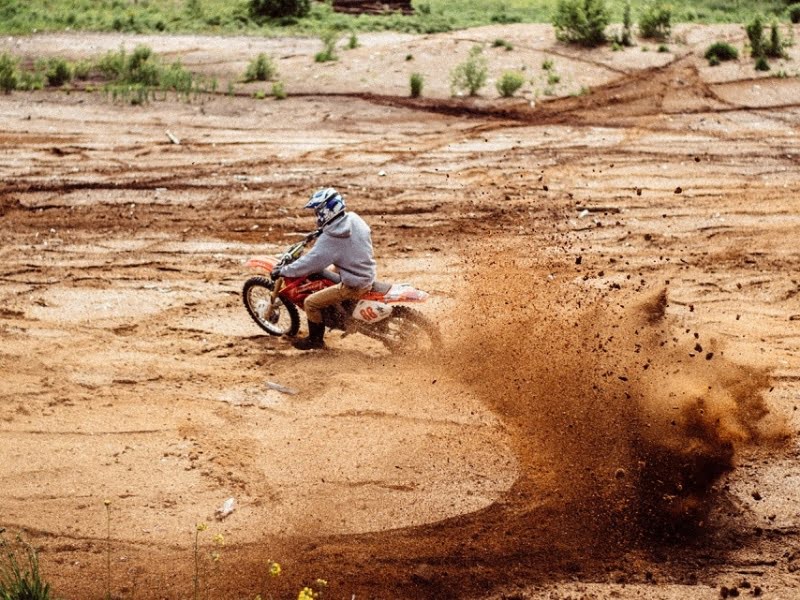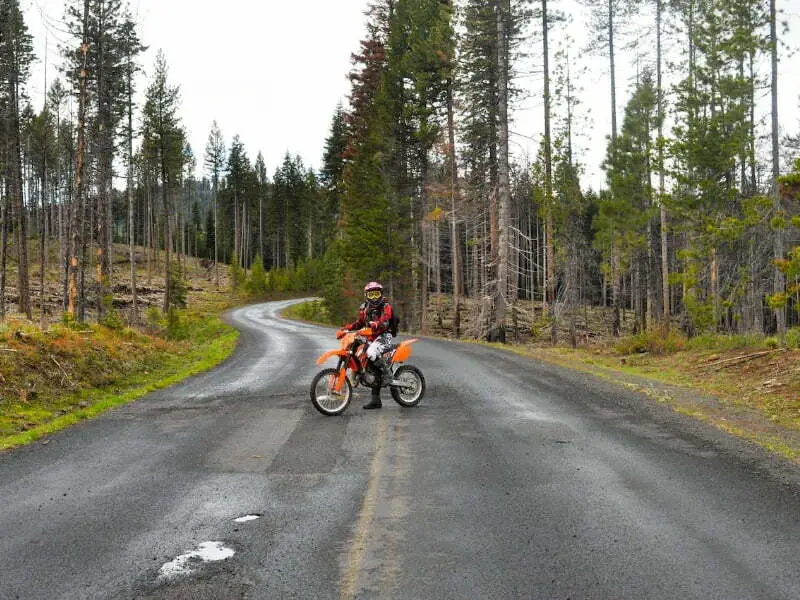By now, you probably know that dirt bikes are only considered street-legal in the US if you modify them to be safe, insure them, and register them for on-road use.
But of course, dirt bikers are not limited to the US of A.
If you’re a rider living in Canada or planning to travel through Canada with your dirt bike, you may wonder – are dirt bikes street-legal in Canada?
Well, not really.
Only if you modify them, insure them, and register them for the road.
Like in the US, you can’t ride your dirt bike on the street as it is.
But don’t worry – there’s a way to make your dirt bike street-legal in Canada.
Keep reading to learn how to ride your dirt bike on public roads without breaking the law!
Are dirt bikes street-legal in Canada? Here’s the Answer
If you want to ride your dirt bike on the streets of Canada, you must ensure it has everything regular motorcycles have, like mirrors, lights, horns, and a speedometer.
That’s the first step to making your dirt bike street-legal.
You must also get dirt bike insurance and get it registered, just like any other vehicle.
That way, you and everyone else are safe and legal on the road.
So, if your dirt bike doesn’t have these things, you can’t ride it on the street.
Dirt bikes are fantastic for off-road riding, but they’re not made for the street.
First, dirt bikes are built for rough terrain, not smooth roads.
They don’t handle well on asphalt and can be hard to control.
Second, dirt bikes have small, bumpy tires that grip the dirt well but not the pavement.
Motorcycle tires are smoother and better for the street.
Dirt bike tires can wear out faster and make your ride less stable.
Third, dirt bikes don’t have the safety features that street-legal vehicles need, like mirrors, horns, and lights.
These things help you see and be seen by other drivers and avoid accidents.
How to Make Your Dirt Bike Street Legal in Canada?
Do you want to ride your dirt bike on the road? Awesome. But first, you need to make it street-legal in Canada. Here’s what you need to get:
- Dirt bike insurance – protects you and your bike if something terrible happens on the road.
- A driver’s license – shows that you know how to ride safely and follow the rules.
- Safety features like lights, signals, horns, and mirrors- help you see and be seen by other drivers.
- A quiet muffler – makes your bike more silent and more respectful.
- An exhaust system that meets emission standards – reduces the harmful gases from your bike.
- A safety inspection certificate – proves your dirt bike is suitable to operate on main roads.
- A blue and white license plate – allows you to ride your dirt bike on main roads and trails.
If you’re not good at fixing or modding your bike, you can ask a mechanic to help you.
They probably know what parts and brands are approved by the law.
Also, check with your local authorities before you start.
Different places have different rules for dirt bikes on the road, so be wise.
Are dirt bikes street legal in Ontario?
Ontario doesn’t let dirt bikes on the streets by default.
But don’t lose hope!
If you modify it, you can still make your dirt bike street-legal in Ontario.
Just follow everything I’ve shared about how to make your dirt bike legal, and you’ll be fine.
One more thing: you need to register your dirt bike as a dual-sport motorcycle.
That’s the key to making it legal!
Still, be careful.
Even if your dirt bike’s already street-legal, some places in Canada don’t allow dirt bikes on highways or cities.
So always check the local laws before you hit the road.
Where can you ride your dirt bike legally in Canada?
The best way to avoid trouble in Canada is to ride your dirt bike where it’s allowed.
Luckily, Canada has some incredible places for off-road fun, like:
Off-road trails

These public lands are nationwide, especially in BC, Alberta, and Ontario.
They’re usually forests, parks, or crown lands that let you ride off-road.
But don’t forget to make your bike ready for these trails.
It would help if you had things like mufflers and a license plate.
Bonus Read: A guide on how to find a dirt bike trail for your off-road adventure
Private lands (with permission)

This is a safe way to ride your dirt bike in Canada.
It might be small and tight, but you won’t get in trouble if you have permission to ride there.
You can ask people you know if they have any private lands they’ll let you use for your dirt bike.
You can also look for private tracks or parks that allow you to ride for a fee or a membership.
Motocross tracks

You can try riding your dirt bike on a motocross track for more fun and challenge.
You can find many motocross tracks in Canada, inside or outside, for different kinds of riders.
But you need to pay to use these tracks, and you may need to register your dirt bike and have insurance.
You’ll get to know the best trails and meet other riders who love dirt biking as much as you do.
Local clubs follow the rules and take care of the land so everyone can enjoy it.
Some clubs charge a fee, but it’s worth it for the fun and friendship.
One of the coolest clubs in Canada is the Ontario Federation of Trail Riders.
Go check them out.
Wrapping up
Dirt bikes are excellent, but you can’t just ride them anywhere.
You must make your dirt bike street-legal in Canada to hit the streets.
That means adding stuff like lights, mirrors, horns, and tires.
You must also pay for insurance and registration, which can be a pain.
A more straightforward option is to get a dual sport bike.
It’s suitable for both roads and trails, no extra work.
You only need a driver’s license to ride them legally.
Whatever you ride, be smart and safe.
Follow the rules, respect the land and people, and wear your gear.
P.S. Just a note that this guide is for general knowledge and is not intended as legal advice.
Please contact your local council for up to date information and advice before making any decisions.



